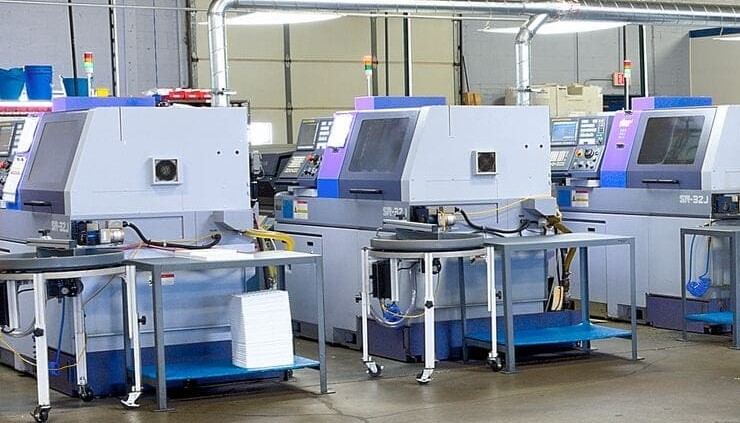CNC Swiss machining and traditional CNC machining are two popular manufacturing processes across many industries. While both methods perform similar functions, they have some differences that are important to understand to select the ideal process for your project.
Here, you’ll learn how each process works, along with their unique benefits and applications.
CNC Swiss Machining vs. Traditional CNC Machining
CNC Swiss Machining
Also referred to as a Swiss-type lathe or automatic lathe, a Swiss computer numerical control (CNC) machine is a specific type of CNC machine that’s capable of manufacturing extremely small components with superior efficiency, precision, and accuracy.
This equipment works using round bar stock that highly trained operators feed into a guide bushing. This bushing secures the material while it travels through the machine’s tooling area. The only portion of the bar stock exposed to the tooling area is the portion to be machined. As a result, this type of CNC machining allows for optimized precision and stability.
In addition, CNC Swiss machines work using more axes than other machines. While traditional CNC equipment operates on X, Y, and Z axes, it’s possible to use up to five axes with a CNC Swiss machine. This greater number of axes allows for increased precision, enabling manufacturers to produce parts down to 0.008″ in size and with tolerances as tight as 0.0002″.
At Pioneer Service, our CNC Swiss equipment can manufacture parts up to a 2.5″ diameter.
Benefits of CNC Swiss Machining
The main benefit of manufacturing parts with a CNC Swiss machine is the ability to produce small, tight tolerance parts due to the proximity of the stock material to the cutting tools, aided by the guide bushing that holds the material firmly in place. This bushing keeps the material from deflecting, which is a risk associated with traditional CNC machines.
Applications of CNC Swiss Machining
Many applications and industries benefit from the enhanced precision of CNC Swiss machining, including:
- Medical device components
- Aerospace components
- Consumer electronics components
- Defense product components
- Automotive components
Traditional CNC Machining
Conventional CNC machining uses automated computer programs and commands to control cutting tools that shape materials to a desired form. This computer-controlled operation allows for increased efficiency, accuracy, and precision compared to manual machining methods. CNC machines can cut, drill, and carve various materials, such as wood, plastic, and metals, to create high-quality, custom parts and products.
Medical equipment, automotive components, and many other applications depend on CNC machines for their high-volume production capabilities and accuracy. These benefits make CNC machining ideal for prototypes as well as end products.
The combined efficiency and accuracy of this process result in lower production costs and shorter project timelines, which is why it’s particularly suitable for high-volume production runs.
Benefits of Traditional CNC Machining
The traditional CNC machining process involves rotating cutting tools over the bar stock material, which extends from the machine’s collet or chuck to the full part length. This process works best for parts with shorter lengths and wide diameters that must meet tight tolerances. It’s also ideal for large parts made of materials that are harder to cut.
Many types of machines operate using CNC systems, with some specific processes including:
- Laser cutting
- Ultrasonic welding
- Friction stir welding
- Spinning
- Bending
- Gluing
- Fiber and tape placement
- Hole-punching
- Plasma and flame cutting
- Sawing
- Picking and placing (PnP)
- Pinning
- Fabric cutting
Applications of Traditional CNC Machining
Some of the many potential applications for traditional CNC machining include:
- Carving and decoration
- Parts manufacturing
- Automotive part fabrication
- Mold manufacturing
- Aerospace component manufacturing
- Automated production lines
- Part finishing
CNC Swiss Machining From Pioneer Service
For reliable CNC Swiss machining, centerless grinding, finishing, and other services, work with Pioneer Service. As an ISO 9001:2015 and AS9100D certified manufacturer, we have the resources and expertise to provide our customers with top-quality precision machined parts for their industry.
Contact us or request a quote today to learn more about our custom capabilities or to get started on your next project.



